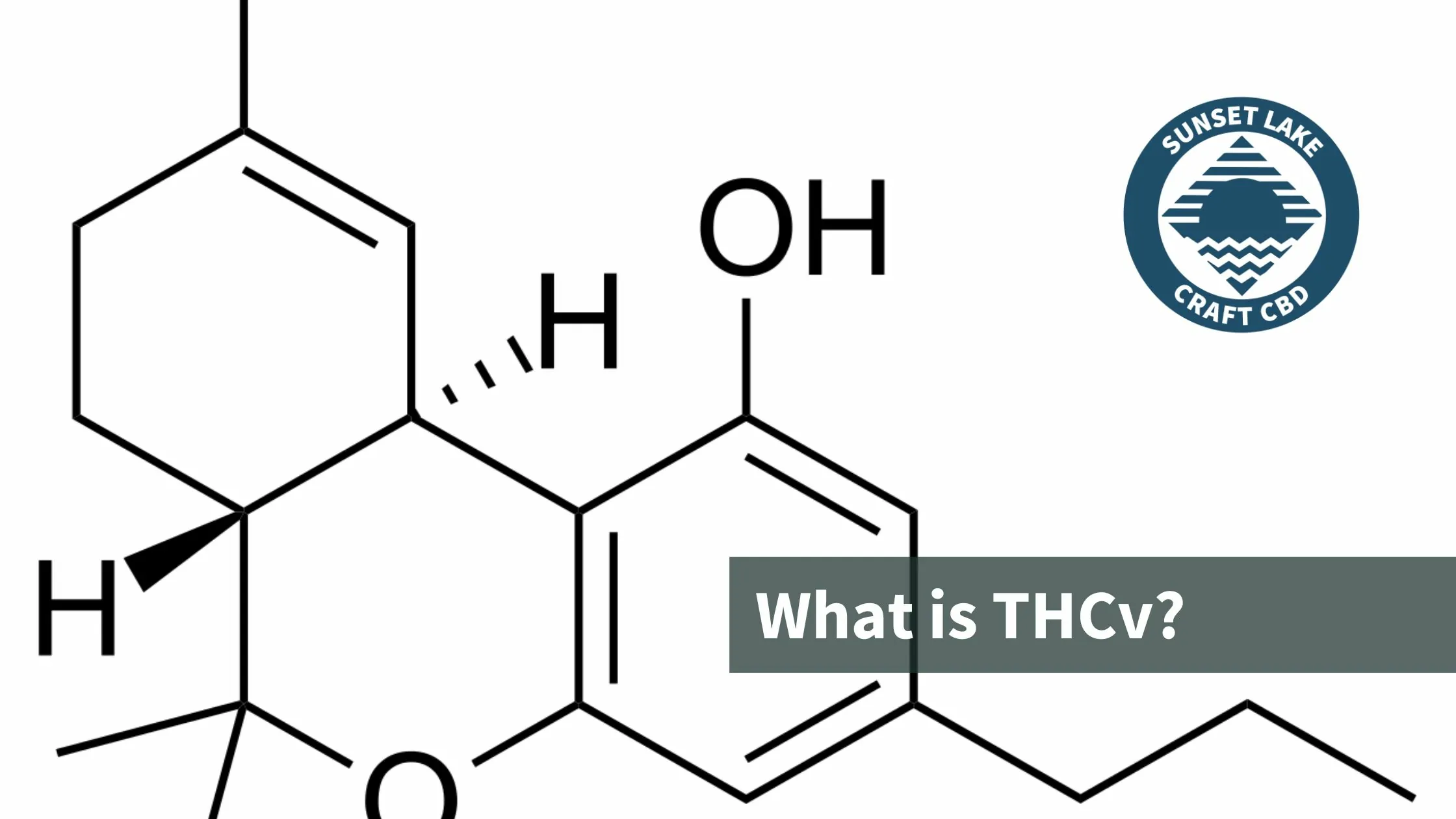No products in the cart.
What Is THCV & What Is It Used For?

The hemp plant produces over a hundred different cannabinoids, but as of now, researchers have only just scratched the surface when it comes to their potential benefits. Some of these cannabinoids you may be familiar with, like CBD, THC, and CBN. Lately, there has been a lot of media attention on the “varin” family of molecules, like cannabivarin (CBDV) and tetrahydrocannabivarin (THCV). Specifically, some articles have dubbed THCV “diet weed” citing claims that THCV might help with weight loss.
In this post, we’ll discuss:
- What it is,
- How it’s different from THC,
- And, THCV’s potential benefits
What Is THCV?
THCV, or tetrahydrocannabivarin, is one of over a hundred different cannabinoids produced by the hemp plant.
Let’s get a little more technical for a moment. THCV is the activated, or decarboxylated, form of tetrahydrocannabivarin acid (THCVa) and is non-intoxicating. THCV is a dose-dependent CB1 agonist and antagonist and a CB2 agonist. It also interacts with many transient receptor potential (TRP) channels, as both an agonist and antagonist1. Long story short: there could be a lot of potential uses for THCV, some of which we’ll discuss below.
Where Can I Find THCV?
Although THCV isn’t found in high concentrations in most commercially available hemp, some hemp cultivars have been bred to produce high concentrations of THCV1. Leafly, a cannabis media website, reports that some African Landrace Sativa cultivars produce substantial concentrations of THCV. THCV can be isolated from hemp and cannabis in a laboratory and concentrated for use in manufactured products.
THCV vs. THC: What’s The Difference?
Despite being so close in name and chemical composition, THCV behaves in a different manner than THC. THC is famous because of the psychoactive, or “high,” feeling you get after consumption. This effect is achieved by activating the CB1 receptors in your brain. THCV is non-intoxicating and does not produce a “high.” THCV can block the CB1 receptor and has been shown to counteract some of THC’s effects in research using mice2.
What are researchers finding?
Research into THCV’s possible benefits is still in its infancy, but momentum appears to be building. Let’s take a look at some of the research on THCV.
In a double-blind 2016 pilot study, THCV, when combined with CBD, showed potential therapeutic benefits for patients with type-2 diabetes7. In small doses, scientists have found that THCV may prevent some of the effects of Delta-9 THC, such as THC-induced hypothermia2.
Here is a list of other research that has been done into the potential effects of THCV:
- weight loss/decrease in body fat1
- appetite suppression/regulation2,4
- anticonvulsant1,3
- hyperalgesia suppressant1,2
- anti-inflammatory1,2,6
- acne1
- anti-addiction effects2,5
- antiemetic2
Since most of this research has been done either in vitro or in animal models, we will have to wait to see what the implications are for humans. So far the research has been promising and it looks like we will be hearing more about THCV in the coming years.
Sources:
- Ahmad, S., & Hill, K. P. (2021). Medical marijuana: A clinical handbook. Wolters Kluwer. pp. 107, 273, 275t, 373
- Pertwee, R. (2016). Handbook of Cannabis (Handbooks in Psychopharmacology). Oxford University Press. pp. 180, 443, 464, 478-479, 572
- Hill, A. J., Weston, S. E., Jones, N. A., Smith, I., Bevan, S. A., Williamson, E. M., Stephens, G. J., Williams, C. M., & Whalley, B. J. (2010). Δ⁹-Tetrahydrocannabivarin suppresses in vitro epileptiform and in vivo seizure activity in adult rats. Epilepsia, 51(8), 1522–1532. https://doi.org/10.1111/j.1528-1167.2010.02523.x
- Luke Tudge, MSc, Clare Williams, BSc, Philip J. Cowen, MD, FRCPsych, Ciara McCabe, PhD, Neural Effects of Cannabinoid CB1 Neutral Antagonist Tetrahydrocannabivarin on Food Reward and Aversion in Healthy Volunteers, International Journal of Neuropsychopharmacology, Volume 18, Issue 6, April 2015, pyu094, https://doi.org/10.1093/ijnp/pyu094
- Xi, Z. X., Muldoon, P., Wang, X. F., Bi, G. H., Damaj, M. I., Lichtman, A. H., Pertwee, R. G., & Gardner, E. L. (2019). Δ8 -Tetrahydrocannabivarin has potent anti-nicotine effects in several rodent models of nicotine dependence. British journal of pharmacology, 176(24), 4773–4784. https://doi.org/10.1111/bph.14844
- Bolognini, D., Costa, B., Maione, S., Comelli, F., Marini, P., Di Marzo, V., Parolaro, D., Ross, R. A., Gauson, L. A., Cascio, M. G., & Pertwee, R. G. (2010). The plant cannabinoid Delta9-tetrahydrocannabivarin can decrease signs of inflammation and inflammatory pain in mice. British journal of pharmacology, 160(3), 677–687. https://doi.org/10.1111/j.1476-5381.2010.00756.x
- Jadoon, K. A., Ratcliffe, S. H., Barrett, D. A., Thomas, E. L., Stott, C., Bell, J. D., O’Sullivan, S. E., & Tan, G. D. (2016). Efficacy and Safety of Cannabidiol and Tetrahydrocannabivarin on Glycemic and Lipid Parameters in Patients With Type 2 Diabetes: A Randomized, Double-Blind, Placebo-Controlled, Parallel Group Pilot Study. Diabetes care, 39(10), 1777–1786. https://doi.org/10.2337/dc16-0650


